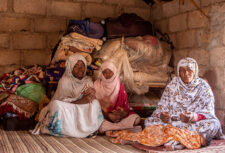Disclaimer: This article is more than 15 years old, and may not include the most up-to-date information or statistics. Please verify information with more recent sources as needed, and if you have any questions contact our Press Office.
27 October 2008
Niger has been found responsible of failing to protect 24-year-old Hadijatou Mani from slavery. The judgement was delivered in Niamey, the capital of Niger today (Monday 27 October) by the Community Court of Justice of the Economic Community of West African States (ECOWAS).
The Court, which has authority across most of West Africa, found Niger in breach of its own laws and international obligations in protecting its citizens from slavery. The Court has made clear that Niger is obliged to take positive measures to protect its citizens from slavery. Ms Mani is to be compensated 10 million CFA, the equivalent of £12,300/$19,000 in damages.
The Court in its judgement stated that: “There is no doubt that Hadijatou Mani was held in slavery for almost 9 years in violation of the legal prohibition on this practice.”
Niger criminalised slavery in 2003, but five years on at least 43,000 people remain enslaved across the country. Hadijatou was born into an established slave class and like all slaves in Niger, was inherited, sold and made to work without pay. She was also used as a sexual slave by her master.
Ms Mani brought the case to the regional ECOWAS court after failing to receive any redress in Niger’s domestic legal system and state authorities, which had at times been complicit in her master’s attempts to deny her freedom.
The case also follows Ms Mani serving two months of a six month prison sentence for bigamy. The charge of bigamy was made following her legal attempts to gain freedom and marrying a man of her own choosing. The judgment is recognition of the long standing abuses she has suffered.
Local lawyers were assisted in bringing the case by INTERIGHTS, the International Centre for the Legal Protection of Human Rights, with support from Anti-Slavery International and Niger NGO Timidria.
Hadijatou Mani, said: “I am very thankful for this decision. It was very difficult to challenge my former master and to speak out when people see you as nothing more than a slave. But I knew that this was the only way to protect my child from suffering the same fate as myself. Nobody deserves to be enslaved. We are all equal and deserve to be treated the same. I hope that everybody in slavery today can find their freedom. No woman should suffer the way I did.”
“With the compensation I will be able to build a house, raise animals and farm land to support my family. I will also be able to send my children to school so they can have the education I was never allowed as a slave.”
Romana Cacchioli, Africa Programme Co-ordinator for Anti-Slavery International, said: “There is nothing more fundamental than the right to freedom. People in Niger now know that if a slave can take the state to court and win, then they too can confidently stand up for their human rights.
“This historic verdict sets a legal precedent that we can take to neighbouring states where slavery remains an issue. Niger now needs to look closely at its customary law courts to ensure that there is an end to the discrimination of women and to the acceptance of slavery at a local level.”
Helen Duffy, Legal Director at INTERIGHTS said: “For Hadijatou Mani this judgment is international recognition of the long standing violations of her most fundamental human rights. During her testimony before the Court she said she was treated like a goat. Today’s judgement reasserts her rights as a human being. For the ten of thousands of others trapped in slavery across Niger the ruling sends an unequivocal message that the long standing provisions on slavery must be given meaning in practice.”
Ilguilas Weila, President of Timidria, an anti-slavery NGO in Niger, says: “For 17 years we have been working towards bringing slavery to the attention of the authorities. Previously there has been a lack of political will to deal with the situation on the ground. The law in 2003 was passed only as part of a charm offensive to please westerners. This verdict means that the state of Niger will now have to resolve this problem once and for all.”
This was the fist time that the ECOWAS Court has heard a slavery case and the first time a slavery case has been brought against the state of Niger to any international or regional court.
The ruling sets a legal precedent with respect to the obligations of states to protect its citizens from slavery. The ECOWAS Court decisions are binding, and the human rights obligations the Court interprets are applicable to all member states.
NOTES TO EDITORS:
- Anti-Slavery International is the world’s oldest human rights organisation and campaigns for the eradication of slavery, exposing current cases, supporting local organisations to release the minimum 12.3 million people in slavery, and the implementation of international laws against slavery. For further information please contact Paul Donohoe, Anti-Slavery International’s Press Officer, on 020 7501 8934 or email p.donohoe@antislavery.org
- INTERIGHTS is a UK registered charity based in London which protects and promotes human rights through the use of law. It brings litigation in key test cases world wide. INTERIGHTS holds consultative status with the United Nations Economic and Social Council, the Council of Europe, the African Commission on Human and Peoples’ Rights and is accredited to the Commonwealth Secretariat. http://www.interights.org
- Timidria Association is a national human rights organisation founded in 1991 with the aim of eradicating slavery and all forms of discrimination in Niger.





